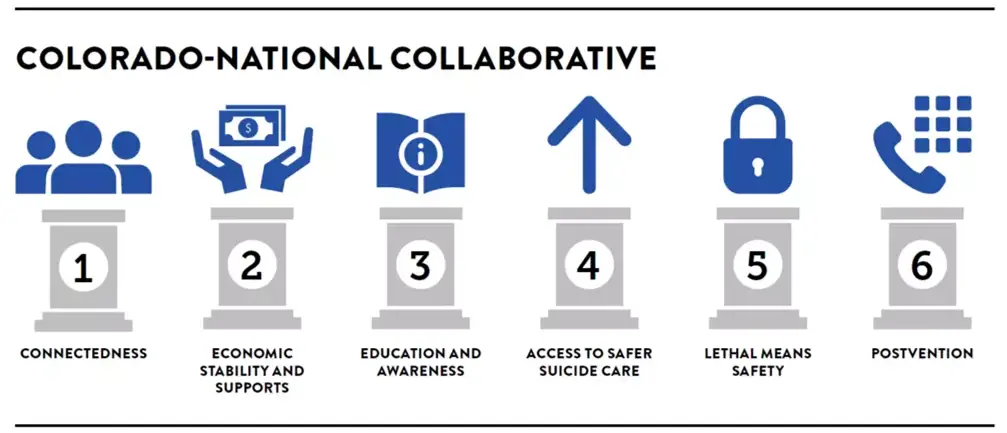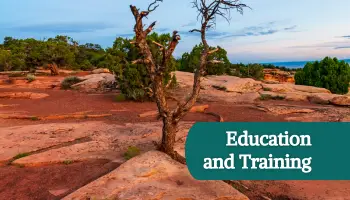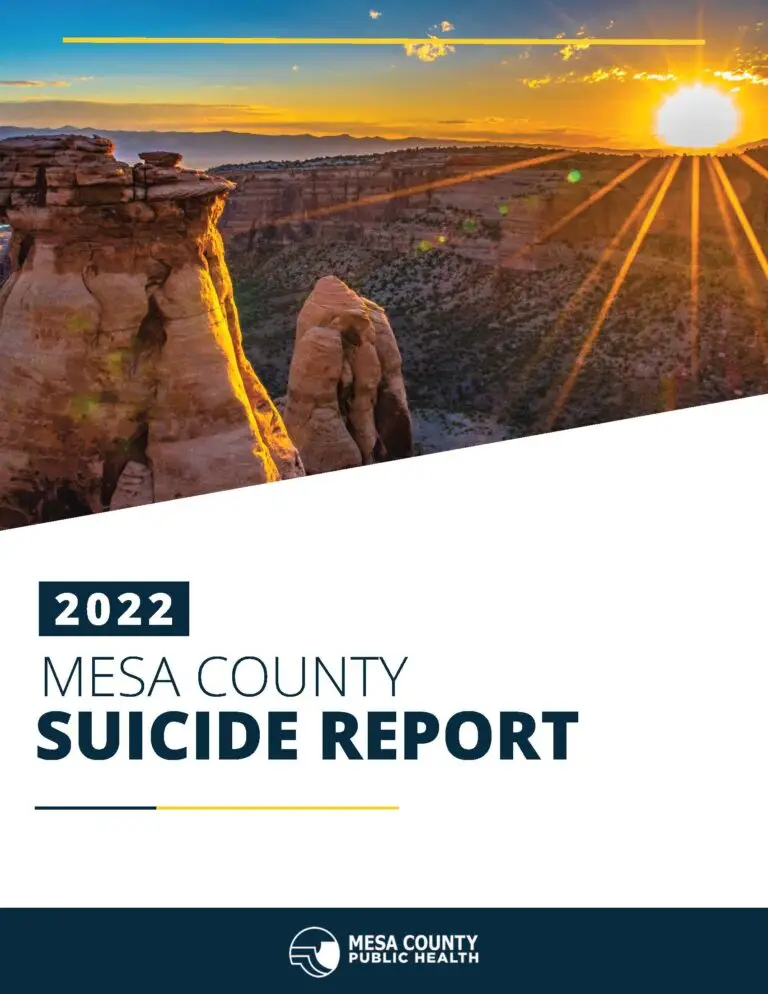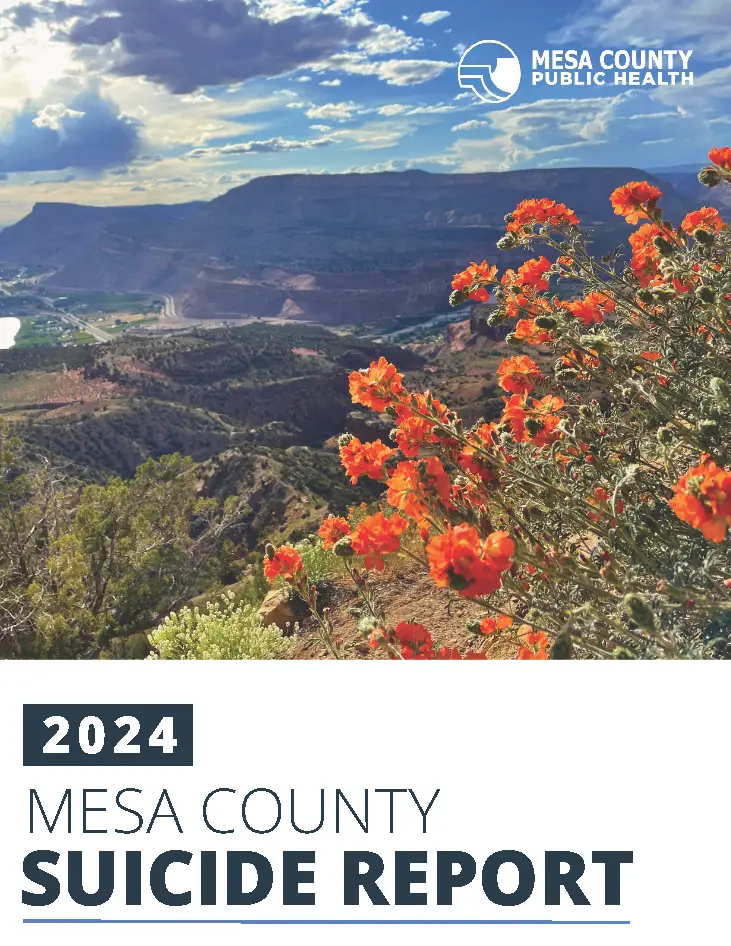About
“You plant seeds every single day, in the world and in others, with every thought you think and word you speak and action you take. You have influence. You’re making a dent in the universe and you matter, in a very real way.”
—Jennifer Williamson, Suicide Loss Survivor and Creator of HealingBrave.com
History
Official organization of suicide prevention activities began through Mesa County Public Health (MCPH) in the early 2000s via a Colorado Health Foundation grant. When this funding expired, the Western Colorado Suicide Prevention Foundation (WCSPF) formed to continue the work of the now-established coalition, including free prevention-related education and events for professionals and the public. WCSPF, along with Second Wind Fund, also provided funding to offset costs for youth emergency counseling.
WCSPF rebranded as the Suicide Prevention Alliance (SPA) and remained open as a nonprofit organization until late 2017. Remaining monies moved to Western Colorado Community Foundation (WCCF), which complemented its commitment to reduce barriers for training access, including LivingWorks Applied Suicide Intervention Skills Training (ASIST), QPR (Question, Persuade, Refer), and Mental Health First Aid (MHFA) curriculums. WCCF still collects funds for suicide prevention and distributes small grants yearly.
Also in 2017, and having been preselected, MCPH began the grantwriting process for Mesa County to join the Colorado-National Collaborative (CNC) for Suicide Prevention, whose aim is to reduce statewide suicide deaths by 20% by 2024. CNC funding was a good fit as its six main “pillars” of work aligned with local efforts already in progress. These seek to: improve connectedness; increase economic stability (a stressor that contributes to suicide); provide education and awareness; improve access and delivery of suicide care (through the Zero Suicide Initiative); address lethal means safety; and increase postvention support and resources. Funding was awarded in 2018 and managed by MCPH for a year before SCL Health (St. Mary’s Hospital; Intermountain Healthcare) assumed the role from 2019-2022. The Counseling and Education Center (CEC) now serves as the fiscal agent and will through the remainder of the grant cycle (2025). Currently, Mesa County is one of eight participating areas.
Community Data
Over the past two decades, Mesa County has kept a keen eye on suicide data in our community. Leading the charge for collecting and keeping track of rates, trends and other related information has been Mesa County Public Health. Below are the last three suicide reports.
The Coalition
Every month a group of caring and committed people gather for the purpose of sharing information and resources for suicide prevention—this group is known as the Mesa County Suicide Prevention Coalition. Participants come from a variety of public and private sector backgrounds, including health and mental health, law enforcement and first responders, education, government, business, academia and nonprofit. There are also multiple contract-based team members whose primary duties are to increase community awareness and to facilitate educational opportunities, while also providing administrative support.
By design, these endeavors are “community-owned” versus being a standalone nonprofit or under another organization’s umbrella. While this puts significant responsibility on those involved to ensure the health and vitality of the coalition, team and engagements, it allows for nimble adaptation to changes in resources, trends and community needs.
Our current efforts
We are one of the eight grantees statewide that are receiving funding through the Colorado-National Collaborative (CNC) for Suicide Prevention, and as such, our activities must support key CNC aims. Fortunately, and not surprisingly, our local efforts were already largely aligned with the focus of CNC, guided by six “pillars” of work.

Building on local efforts already in place, members of the coalition and the community at-large are playing a big part in advancing our work across these areas. Specifically, SPMC is focused on the following: coalition building and community awareness, education and training; employer recruitment and resources; data tracking and coordination; and attempt and loss survivor resources. Read on for more specific information about what is going on in each area.

The coalition is an entry point for learning about and engaging with suicide prevention efforts in Mesa County. Participants share ideas, challenges and events to inform and to coordinate with others. Also, alert to this topic’s heaviness, the high-trust connections developed with each other provide added layers of support and understanding.

For free or low-cost, residents of all walks—from first responders to faith communities—can access a variety of world-renowned and best-practice suicide prevention programs, including ASIST, QPR, Mental Health First Aid (for youth and adults), Soul Shop and REAL Essentials Respond. More options are also available through coalition partners.

Many people spend more time with their coworkers than their families— which makes the workplace an essential environment for spotting suicidality. Incorporating suicide prevention procedures and policies in business (e.g., including language in an employee handbook) is an important, and potentially lifesaving, endeavor.

Notable expertise and skills in data collection and interpretation is provided by MCPH. Through their partnership with local hospitals and health providers, data analysts can more quickly receive and review a wider array of information points and can identify trends, flag potential concerns and recommend responsive action.

Unique to Mesa County, there is a dual-focus partnership with the Coroner’s Office which provides 1) death investigators with access to suicide-specific expertise and 2) loss survivors with a point of contact for support. This style of case coordination covers a spectrum of concerns and needs, from processing grief to more tactical to-dos.
Frequently Asked Questions (FAQs)
What about…? Where do I…? Who might know…?
We imagine these types of questions (and others) may be top of mind, and we’ll do our best to answer any questions you have. See our Frequently Asked Questions (FAQs) section below to see if we may already have an answer available. If not, we invite you to submit a question via the button below.
Colorado Mesa University
Colorado National Monument
Colorado State University Extension
Community Hospital
Counseling and Education Center (CEC)
Family Health West
Freedom Institute
Grand Junction Housing Authority
Grand Junction Veterans Affairs (VA) Medical Center
Hilltop Community Resources
HomewardBound of the Grand Valley
HopeWest
Intermountain Health (St Mary’s Medical Center)
Loving Beyond Understanding
Marillac Health
Mesa County Commissioner
Mesa County Coroner’s Office
Mesa County Department of Human Services
Mesa County Libraries
Mesa County Public Health
NAMI Western Colorado
Nurse Family Partnership
Peer 180
Project 1.27
School District 51
The Second Wind Fund
Western Colorado Community Foundation
Western Slope Area Health Education Center (AHEC)
Western Slope WAGEES
Suicide Prevention Mesa County (SPMC) is not an official nonprofit 501(c)(3) and therefore relies on the generosity of its partners to provide fiscal and human resources management for its contract staff and grant monies. Currently, this is provided by the Counseling and Education Center (CEC).
First, we’d recommend taking a class—Mental Health First Aid (MHFA), Youth Mental Health First Aid (Youth MHFA), Applied Suicide Intervention Skills Training (ASIST), or Question, Persuade, Refer (QPR). You can register for our upcoming classes here. If you’re not sure which one might be best for you, Jennifer Daniels, a team member of SPMC, would be happy to chat through what might be the best fit for you. Email her at [email protected].
From there, you could consider:
- Talking to your employer about adding suicide prevention related resources or policies
- Encouraging family, friends and community members to take a class
- Sponsoring or hosting a class at your workplace or other community gathering place
- Attending or Joining the Suicide Prevention Coalition
- Making a donation (through our HR/Fiscal agent, CEC) to cover costs that are not eligible for federal grant monies we receive (e.g., training materials and facility costs)
Attending a training can be super helpful for learning more about how you can prevent loss by suicide—you can see what’s coming up and register here.
We’ve also included a link to various informational sites on our Resources page.
We’ve got some great resources for suicide attempt survivors and loss survivors on our Resources page.
Contact Us
If you have an inquiry that is not related to expressing interest in joining the coalition, submitting a question, or signing up for a training … then feel free to use the contact form below.
You may also contact us directly at [email protected].




